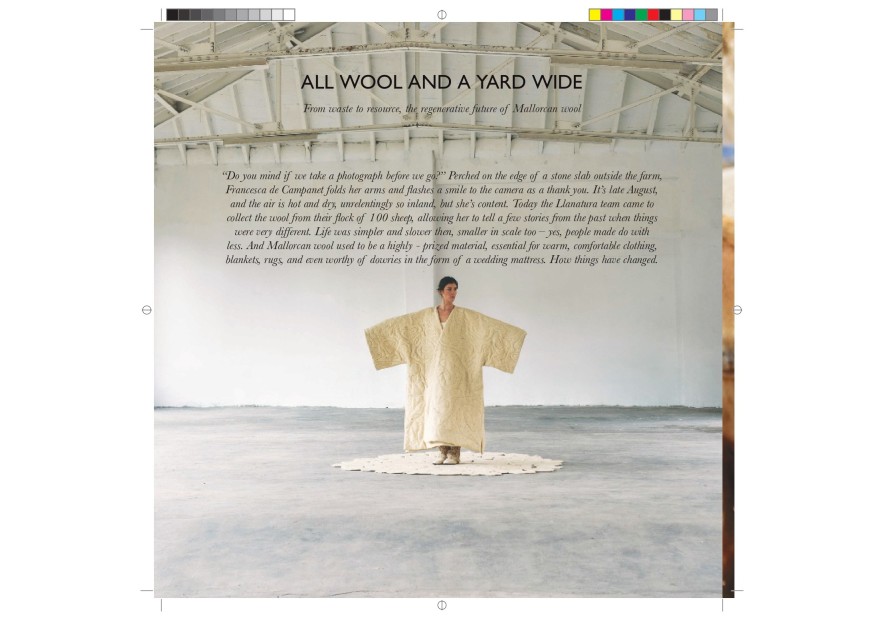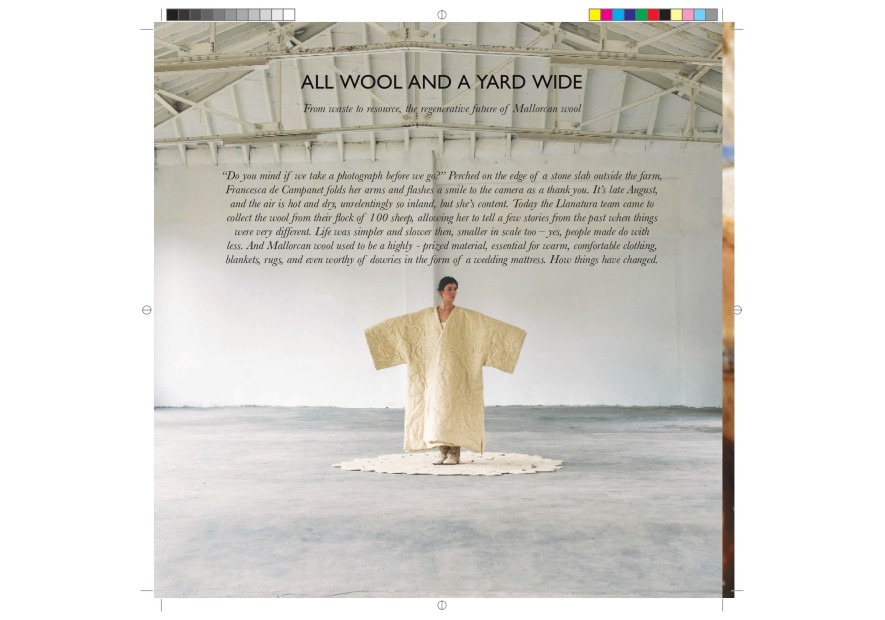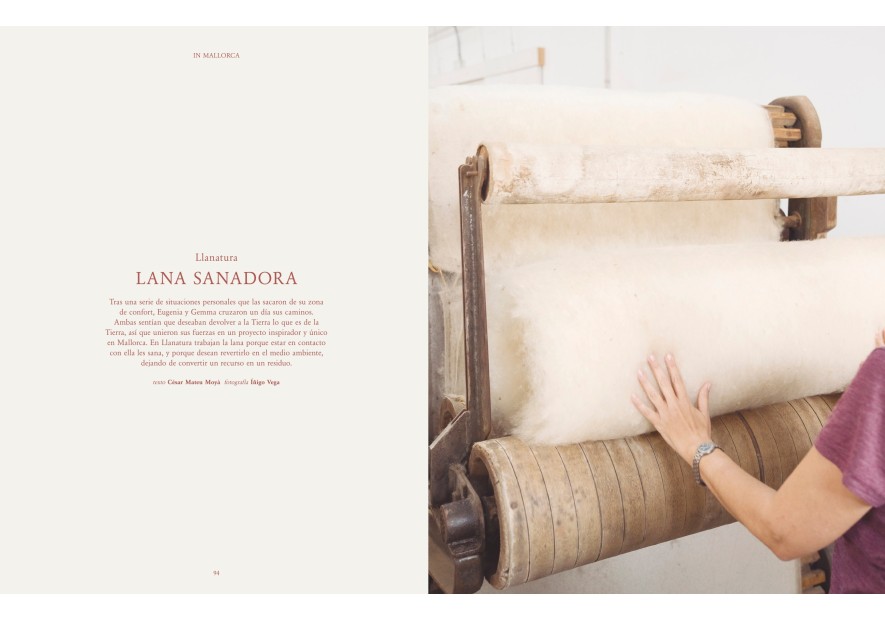seldvege magazine

ALL WOOL AND A YARD WIDE
From waste to resource, the regenerative future of Mallorcan wool
“Do you mind if we take a photograph before we go?” Perched on the edge of a stone slab outside the farm, Francesca de Campanet folds her arms and flashes a smile to the camera as a thank you. It’s late August, and the air is hot and dry, unrelentingly so inland, but she’s content. Today the Llanatura team came to collect the wool from their flock of 100 sheep, allowing her to tell a few stories from the past when things were very different. Life was simpler and slower then, smaller in scale too – yes, people made do with
less. And Mallorcan wool used to be a highly - prized material, essential for warm, comfortable clothing, blankets, rugs, and even worthy of dowries in the form of a wedding mattress. How things have changed.
Eugenia Marcote and Gemma Salvador have heard stories like Francesca’s countless times, but they always stop to listen and learn. In just over half a century, the local elders have watched their wool decrease in value to become a waste product of livestock farming, destined to be collected and then sent to the mainland to be processed.
Acutely aware of the causes and consequences of this woeful situation, the women have decided to do something about it. Through their community – based, circular initiative, they intend to promote wool’s qualities, catalysing its transformation from waste to resource. Indeed, they see no other option: “We firmly believe that the future will be circular or it will not be, in the same way, that the future will be collaborative or not be,” Marcote and Salvador add.
The entrepreneurs met through a mutual friend during the Pandemic and connected immediately. From different backgrounds, both had experienced a professional crisis prompting them to step outside their comfort zone into the healing world of wool. Eugenia has been a wool artisan specialising in spinning and dyeing since 2013, and Gemma wanted to create a project with a real educational and transformative vision to solve local and environmental problems on the island.
Llanatura, the combination of three words in Mallorcan (Catalan): llana (wool) + natura (nature) + atura (stop), aims to revalue wool, a local, renewable material that comes from the rural environment they wish to preserve, and ultimately bring the unsustainable production and consumption system to an end.
Although the project has been well-received by like-minded islanders from the outset, government subsidies to help promote and consolidate it are non-existent. “The Balearic Islands is a territory that has focused economically on promoting tourism, and there are currently no instruments to promote enterprises like ours with a purpose of triple impact: economic, environmental and social,” writes Gemma. Llanatura materialised thanks to the women’s hard work and, most importantly, the trust and support of Fundació Es Garrover, a non- profit organisation working for the social and labour insertion of people with mental health disorders in the area.
In 2022, the project received two research grants to study the development of new uses of wool, from native sheep. Mallorca boasts two indigenous breeds, Oveja Mallorquina, The Mallorcan Sheep, and Ovella Roja Mallorquina, The Mallorcan Red, which perfectly adapted to their environment, are part of the island’s genetic and cultural heritage. Both are in danger of extinction. To preserve these autochthonous breeds and restore the value of their precious wool and Mallorcan wool in general, Llanatura has chosen to work with their undyed palette of white and beige. From the Mallorcan Red, black, produced by a recessive gene present in many breeds, blacks have long been underestimated, and light brown, their blend of white and black. They process wool from various mixed-origin breeds cohabiting the island, in contrast to the general global wool market, which prefers readily dyeable white.
Eugenia and Gemma like to select their wool on-site from the farm where sheep are not stressed. The fleeces are sent to their warehouse in Inca after shearing and then taken to the workshop to be processed. Every step of the felt-making journey is artisanal, respectful, and slow: the raw wool is manually rid of plant debris, and hand-washed with neutral soap and water to remove lanolin and mineral impurities, yelding only half of its original weight, then passively carded, machine felted then given one last wash to ensure that the fibres remain resistant and re-felt with the wet-felting technique. The end product is ironed and ready for use.
If Llanatura is to bring about any change, it has to make a difference. As a fledgling initiative offering a carefully -considered range of products and services on and offline, its reach is beginning to grow. It supplies the island’s artisan and maker population through its Raw catalogue, including clean, carded, and felted wool and felt ‘recover strips’ recuperated from the production process. Its factory doors are open to anyone who wants to visit, and designers such as Accidente Con Flores seek to collaborate on projects using these raw materials. The Home catalogue, grouping blankets, bedspreads, rugs, and cushions, etc., caters to conscious consumers looking for local, natural products for their interiors. Mind comprises virgin wool felt yoga toppers, Harakamis and traditional Mallorcan shoes designed to offer functionality, beauty, and serenity. It sells this range wholesale to a dozen or so boutiques in Mallorca.
As a crucial part of its development, Llanatura wants to add value to its offering by collaborating with a hand-picked selection of textile designers whose vision align with its own. Elisabeth Colom, the founder of SantaPalma, is one such professional. As a creative consultant for the brand’s design identity, she instinctively knew how to translate the project’s content and purpose into products and images. For example, the Lifestyle range featured here captures the essence of the Mallorcan landscape’s colours, textures and shapes scattered with grazing sheep and dry stone walls. Similarly, Llanatura recently revealed pieces from its second collaboration with Mallorca-based creative Adriana Meunié, whose stunning textile works celebrate the raw, natural beauty of local materials and traditional handicrafts.
Llanatura aims to be a transformative holistic ecosystem. It believes wool can connect the primary, secondary, and tertiary sectors. By listening to local shepherds, producing high-quality products, generating enriching creative collaborations and continuing its current research on turning unwashed wool into a resource, as well as developing inclusive work with vulnerable people, it hopes to “connect hands, mind and heart,” one fleece at a time. Deborah Eydmann



Leave a comment